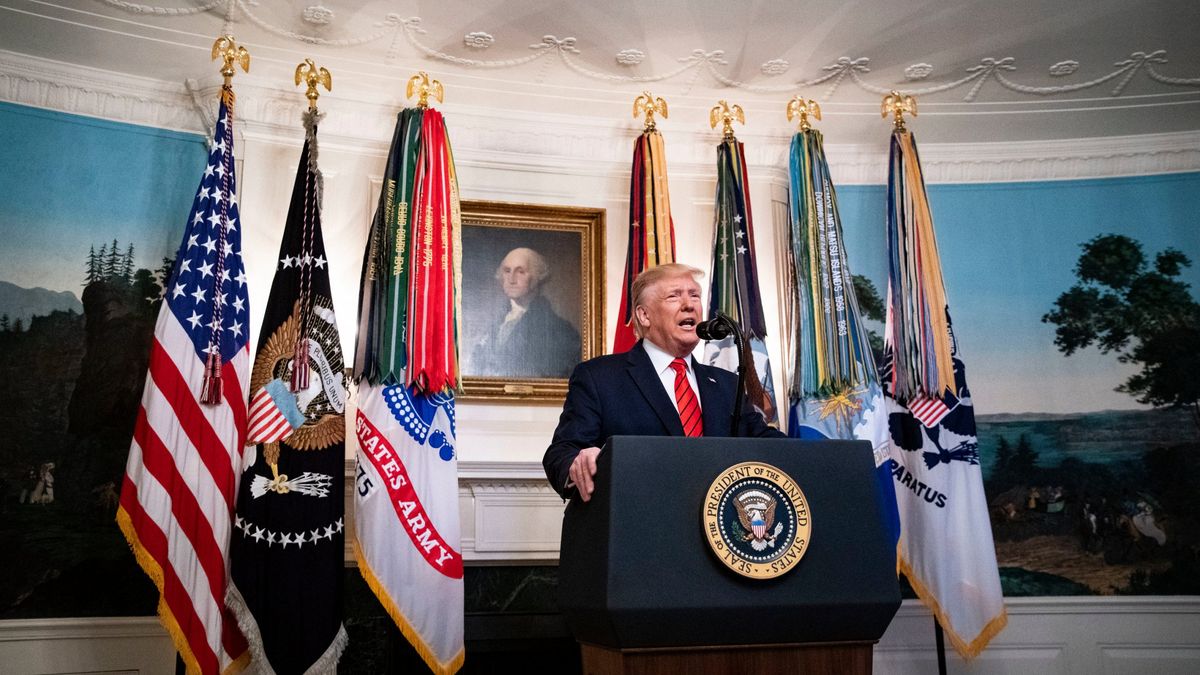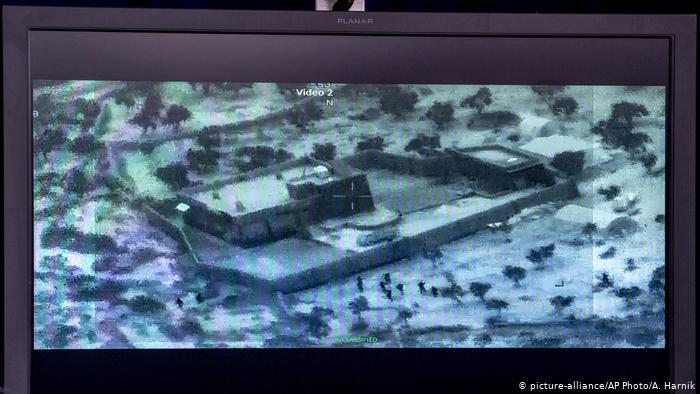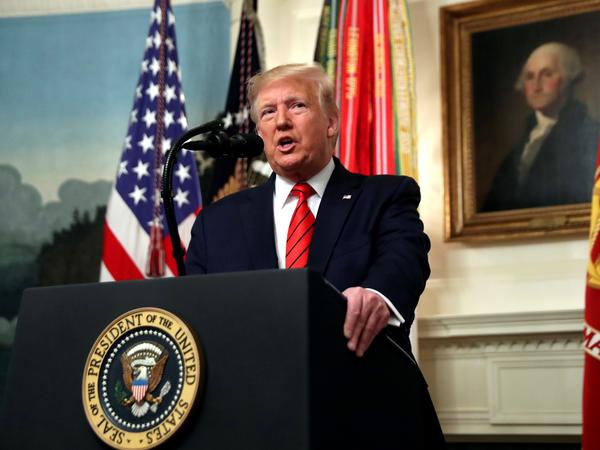Islamic State leader killed in US Special Forces raid

A few minutes every morning is all you need.
Stay up to date on the world's Headlines and Human Stories. It's fun, it's factual, it's fluff-free.
On Sunday, October 27, President Trump announced the death of Abu Bakr al-Baghdadi, the leader of the Islamic State (IS), the terrorist group that gained global notoriety in the wake of the Syrian Civil War, with significant territorial gains in Iraq and Syria. The president revealed that on the evening of Saturday, October 26, US special forces conducted a raid in Syria that ended in the death of the fugitive. The death of al-Baghdadi marks the end of an extensive pursuit of one of the world’s most wanted terrorists.
The death of the elusive yet prominent figurehead is a blow to IS, whose influence and territory has significantly waned in recent years. Despite the death of its leader, some analysts believe that this event does not represent the end of the terrorist organization.
Details of the operation
Supplemented by Kurdish intelligence and information provided by disaffected IS members-turned informants, the US traced al-Baghdadi to a location in Syria’s Idlib province.

CNN reports that the successful operation commenced at 5 p.m. on Saturday. Eight helicopters carried troops from elite units, including Delta Force (the combat unit that performs the most high-profile and high-risk operations assigned by the US military), over Syrian territory. During the flight, the helicopters were targeted by sporadic gunfire from the ground.
The US special forces were greeted by resistance from IS fighters when they arrived at the compound. US forces reportedly killed “a large number of IS fighters" without suffering any fatalities. In addition to the IS casualties, US forces also captured two IS fighters, 11 children and two of al-Baghdadi’s wives. They were all taken into custody.
Baghdadi eventually retreated into an underground tunnel after being pursued by US forces. He then detonated an explosive vest in the tunnel, killing himself and what are believed to be three of his six known children.
In the immediate aftermath of the operation, US forces on the ground conducted DNA tests on the body of al-Baghdadi, which positively confirmed his identity. Alongside the elimination of al-Baghdadi, the US forces obtained “highly sensitive material and information… having to do with ISIS," according to President Trump.
[article_ad]
US reaction
The killing of al-Baghdadi fulfills a primary national security objective of the Trump administration. He was one of the world’s most wanted terrorists and was the subject of a $25 million bounty.
President Trump announced the death of the fugitive leader of IS in a televised national address on Sunday, during which he vividly described the raid.
“The thug who tried so hard to intimidate others spent his last moments in utter fear, in total panic and dread, terrified of the American forces bearing down on him," said President Trump. “He didn’t die a hero; he died crying, whimpering and screaming."
During al-Baghdadi’s brutal reign as IS leader, the group released videos that showed the beheading of foreign prisoners, including American journalists and humanitarian workers. As the leader who oversaw the campaign of beheadings, his death brings a sense of justice to the families of those murdered by IS.
Diane Foley, the mother of journalist James Foley who was murdered by IS in Syria in 2014, said in a statement, “I am grateful to our president and brave troops for finding ISIS leader al-Baghdadi. I hope this will hinder the resurgence of terror groups and pray that captured ISIS fighters will be brought to trial and held accountable."

Trump faces criticism over raid
Although Trump alluded to the raid in a cryptic tweet, he disregarded convention by not informing Democratic leaders of the assault. The president justified this move, saying he wanted to avoid the possibility of leaks and, therefore, any risk to American lives. “I wanted to make sure this was kept secret," he adds, “I don’t want to have people lost. A leak could have caused the death of all of them."
Responding to a question from a reporter as to why he didn’t inform House Speaker Nancy Pelosi of the military action, Trump instead criticized House Intelligence Committee Chairman Adam Schiff, who has been leading the Democrats’ impeachment inquiry.
Nancy Pelosi praised the “heroism, dedication, and skill of our military and our intelligence professionals" before criticizing the president’s decision to keep the Democrats uninformed about the raid. In an official statement, Pelosi said that the “House must be briefed on this raid, which the Russians but not top congressional leadership were notified in advance.”
In response to the raid, Democrats praised the troops involved in the operation. “This victory was not due to Donald Trump’s leadership," former Vice President Joe Biden said on Monday. “It happened despite his ineptitude."
[article_ad]
Global reaction
Global leaders have reacted by praising the US for the successful operation while remaining mindful of the continuing threat of IS despite the death of its leader.
French President Emmanuel Macron said in a tweet that, while the death of al-Baghdadi was a blow to the organization, it’s only a step and “the fight continues with our partners in the international coalition so that the terrorist organization is definitely defeated."
Boris Johnson, the British prime minister, echoed the caution expressed by Macron. “The death of Baghdadi is an important moment in our fight against terror, but the battle against the evil of Daesh [Isis] is not yet over."
The deputy leader of the UN, Farhan Haq told reporters that the death of al-Baghdadi presented an opportunity to remember the victims of terrorism rather than revel in the death of a terrorist leader. Haq said IS “has committed heinous crimes and brought tragedy and death to thousands of men, women, and children, and we should take this moment to remember the victims, and families of victims of terrorism everywhere in the world."
Although President Trump praised Russia for their assistance in the operation, Russian officials were not as steadfast in their praise or acknowledgment of the operation. The Russian military questioned the US account of the raid. An official added that the Russian military was not aware of any US military operations in the region.
In a statement, Russian Defense Ministry spokesman Major General Igor Konashenkov said the Russian military “does not have reliable information" on a US raid in Syria. He said: “The increasing number of direct participants and countries that allegedly took part in this ‘operation,’ each one giving completely contradictory details, raises legitimate questions and doubts about its existence and especially the level of its success."
[article_ad]
Who was Abu Bakr al-Baghdadi?
Abu Bakr al-Baghdadi is believed to have been born in Iraq in 1971. He made unsubstantiated claims that he was a descendant of a tribe closely linked to Muhammed. After graduating from high school, he failed in his attempt to join the Iraqi military, being deemed unfit for service because of shortsightedness.
After the US-led invasion of Iraq in 2003, al Baghdadi helped to found the militant group Jamaat Jaysh Ahl al-Sunnah wa-l-Jamaah, where he served as the head of the shariah committee.
In February 2004, US forces arrested al Baghdadi and detained him at Abu Ghraib and Camb bucca detention centers for nine months.
After rising through the ranks of al-Qaeda’s Iraqi division, al-Baghdadi claimed responsibility for masterminding large-scale operations such as the 2011 suicide bombing at the Umm al-Qura Mosque. Following the death of the founder and head of al-Qaeda, Osama bin Laden, al-Baghdadi also claimed responsibility for an attack in Hilla that killed 24 police officers and wounded 72 others.
After the Islamic State established a caliphate in Iraq and Syria, al-Baghdadi declared himself the caliph – the political and religious figurehead of the worldwide Muslim community. While the vast majority of the Muslim world rejected this, thousands of foreign fighters flocked to the cause of IS.
The significance of al-Baghdadi’s death is that it further erodes the legitimacy of IS. In March, IS lost control of its last remaining stronghold when it surrendered and withdrew from the Syrian city of Baghou. Having once controlled an area the size of Great Britain, IS lost the territory it had gained in the offensives into Iraq and Syria.
The defeat in Baghou prompted the re-emergence of al-Baghdadi when he made his first appearance in five years via the release of a video. The video was interpreted as an attempt to solidify his leadership against opposition from within IS and to demonstrate that the group continues to exist despite losing territory. However, the death of al-Baghdadi raises questions about the legitimacy of IS as a terrorist organization after having lost both major territory and its leader.
What does his death mean for IS?
Much fanfare has met the death of al-Baghdadi, particularly from President Trump, who claimed that the death of the IS leader is more significant than that of Osama Bin Laden in 2011. However, Dr Lina Khatib, director of the Middle East program at the Think Tank Chatham House, believes that the death of al-Baghdadi does not mean the immediate and automatic end of IS. Michael Leiter, a former US counterterrorism official, reaffirmed this sentiment in an interview with Vox, saying that the threat posed by the thousands of ISIS fighters is “not gone at all."
The death of al-Baghdadi leaves IS without a leader to follow and a figurehead for supporters to rally behind. But counterterrorism experts expect the ideology, and threat, of IS to endure. “The bottom line is: this puts the enemy on its heels, but the ideology, and this sounds so cliched, it is not dead," said Chris Costa, a former senior director for counterterrorism for the National Security Council.
“I’ve always said, yes, I will celebrate when Baghdadi is dead, but at the same time, that celebration is quiet and quick, because there are other Baghdadis out there who have been radicalized," added Costa.
The death of al-Baghdai comes at a time when the US is withdrawing its military forces from Syria. The decision by the Trump administration to abandon its Kurdish allies and step aside for an impending Turkish invasion in the region has raised concerns about the re-emergence of IS.
There are also concerns about the security of IS prisoners in the region after hundreds of inmates escaped a facility in Syria following Turkish airstrikes in the area.
[article_ad]




Comments ()